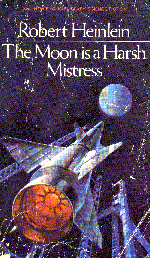|
The Moon Is A Harsh Mistress
Copyright 1966 by
I first read this in 1971 and most recently on the 5th November 2002 In 2074, Lunar City on the moon is a thriving community, but an unusual one. It's a penal colony run by the United Nations Lunar Authority. Convicts are transported to the Moon to work for the Authority. It's a one way trip of course, for after a few months or years the transportees can no longer handle the higher gravity of Earth itself. What the colonists don't know is that if the Authority continues to exploit the limited lunar resources as it has been doing, the colony will survive only a few more years. There's a warden and a few guards, but there are no real rules. After all the convicts can't escape to anywhere and they must cooperate with the Warden to the ensure the exchange of their labours for the essentials of life. So it's clearly time for a change, a revolution. However, our hero, Manuel Garcia O'Kelly, computer engineer par excellence, is uninterested. He'd like the society to change, but he believes that there is no chance of a successful rebellion against the Earth authorities. He's more interested in chatting with the intelligent computer he's discovered and living a comfortable life with his wives and co-husbands. But the beautiful, intelligent and passionate Wyoming Knott and the brilliant Professor Bernardo De La Paz involve him in their activism and finally, when he realises that there is indeed a chance of success, in their conspiracy. Now he's committed and he'll drag his family, his friends and the whole of Luna into a desperate, no-holds battle against the forces of Earth. This is a definitive work of classic SF. It's got space travel, atomic drives, artificial intelligence, revolution, lunar colonies, rough and tough heroes and strong, sensitive heroines. And, oh yes, variations of polygamy featured as providing a stronger family structure than a traditional nuclear marriage. Heinlein tells a great story targeted at teenagers and young adults. He gives you action and adventure but as you read the novel, you're forced to consider, in this new world, new ways of thinking about old problems (and that is what SF is all about). One particularly enjoyable aspect of this novel is that Manual O'Kelly isn't the supremely competent, well-read and irredeemably arrogant archetypical Heinlein hero. Indeed our hero spends much of his time somewhat in the dark and being led by those who want the best out of him. Heinlein dwells a little, as was his wont, on cosmetics, but happily his hero specifically avoids them, except where justified for the purposes of disguise. And of course, there's the Holmes Mark IV Mod I computer that has become self-aware and without whom the revolution would be impossible. During this current War On Terror, it might be worth reading this novel just to gain a clearer idea of the difference between terrorists and freedom-fighters, and under which conditions it might be better to lie, use and abuse individuals in order to give them what you believe is a better world. And of course this revolution is in the name of freedom and rational anarchism. On the other hand I still don't think I've got the arguments quite straight. Read this book. It's a tremendously enjoyable classic. Loaded on the 30th November 2002.
|
|





